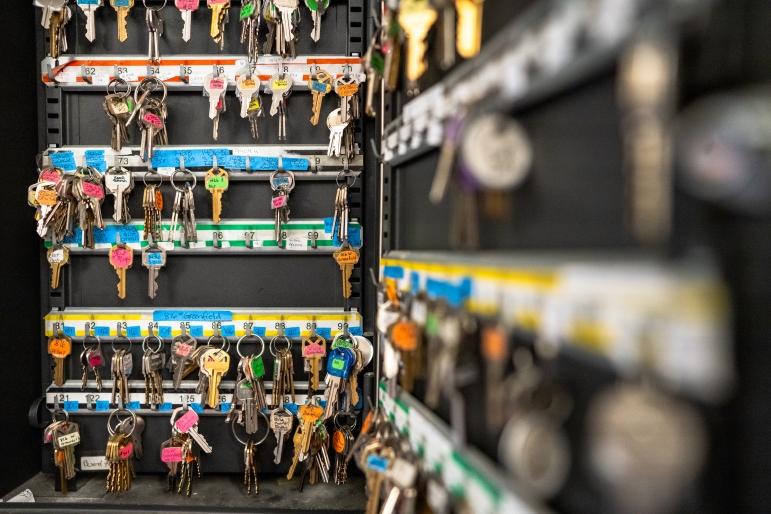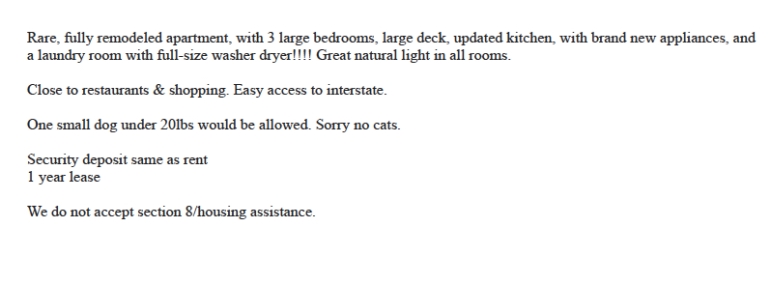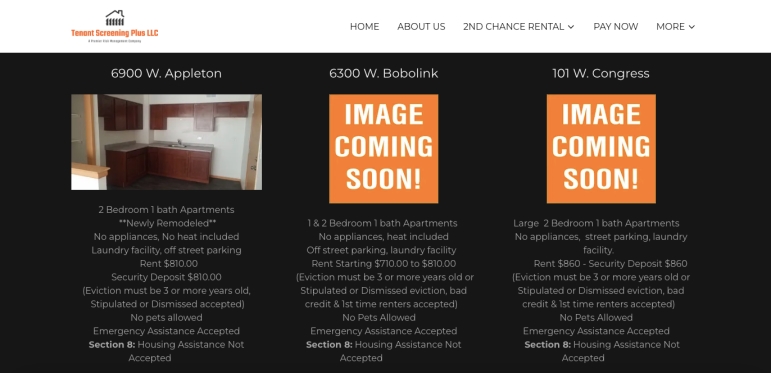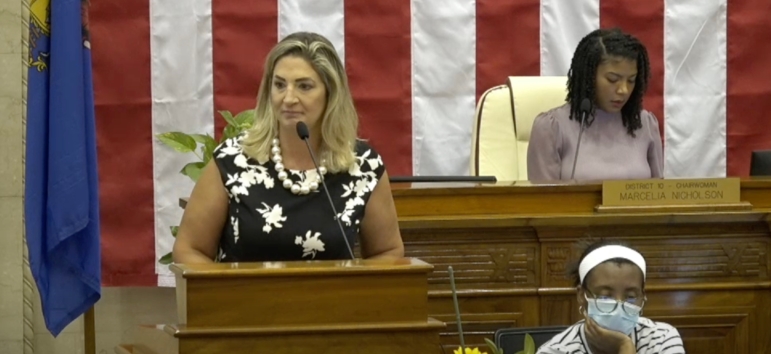County Banned Housing Voucher Discrimination. Landlords Still Do It
County officials not sure they can enforce provision. Many vouchers go unused.

Ebony Donald stands in front of the Community Within the Corridor, a mixed-use affordable housing complex at the former Briggs and Stratton site on Milwaukee’s North Side, on June 5, 2023. Donald lived there with her children for about a month after receiving her Section 8 voucher, but they were among more than 150 residents evacuated following the detection of high levels of cancer-causing trichloroethylene. The family lived in a hotel during a second challenging search for a landlord who would accept the voucher. (Jonmaesha Beltran / Wisconsin Watch)
This story was originally published by Wisconsin Watch.
Jasmine Varela forgot she applied for a housing choice voucher until a letter arrived in 2023. After languishing on a waitlist for 14 years, she learned the city of Milwaukee’s housing authority would finally issue her a Section 8 voucher. She thought the rent subsidy would help her provide a better life to her four children.
“I was excited because I thought I was going to get a nice house, more rooms for my kids and a better neighborhood,” she recalled.
Feeling desperate about 90 days into her quest, she put aside her pride and asked family for help.
She hoped to find a house closer to her children’s South Side Milwaukee school, but eventually found just one landlord, across town in Old North Milwaukee, who would accept the voucher and work with her credit history. Her mother worried about safety in the neighborhood, but Varela felt she had no choice but to sign the lease before her voucher would expire on Jan. 28.
South Side Milwaukee landlords she encountered weren’t willing to accept voucher aid, Varela said, adding that several doubted they would pass inspections required by the program.
Section 8, the federal government’s largest low-income housing subsidy program, serves 2.3 million households nationwide, including more than 16,500 people in Milwaukee County in 2022, according to the U.S. Department of Housing and Urban Development (HUD).
It aims to broaden housing access for participants, but renters and housing advocates say landlords outside of historically disinvested neighborhoods rarely rent to people with vouchers — one of many factors limiting opportunities in Milwaukee and nationwide, particularly people of color.
Milwaukee County in 2018 banned landlords from categorically rejecting recipients of housing assistance. More than five years later the county’s Office of Corporation Counsel, which is supposed to enforce the protections, says it has yet to receive a verified complaint of such discrimination.
That’s not for a lack of discrimination, a Wisconsin Watch investigation found.
Some landlords continue to explicitly reject Section 8 applicants — even saying so in public listings. Four Section 8 renters told Wisconsin Watch no one informed them about the protections or how to file a complaint.
Milwaukee County and the city of Milwaukee operate separate housing agencies that distribute Section 8 vouchers, with the majority coming through the city. Only the county’s authority mentions the 2018 protections in information packets meant to help renters navigate the program. Neither packet says how to report income-based discrimination to the county.
West Allis operates the only additional housing authority in Milwaukee County that distributes Section 8 vouchers. Its information packet notes protections against income-based discrimination, but it instructs renters to file complaints to a city agency rather than with the county. The city in 2022 received just three housing discrimination complaints — none of which prompted enforcement, its officials said.
Milwaukee County Chief Corporation Counsel Margaret Daun told Wisconsin Watch her office questions whether the county has legal authority to enforce the ordinance.
“Our office remains concerned that individual Section 8 discrimination enforcement actions rarely result in the immediate help that is needed by the person seeking housing,” she said in an email.
Wisconsin Watch also found:
- A 120-day federal deadline for voucher recipients to find housing may further discourage discrimination reporting due to the unlikelihood of resolving complaints swiftly. But the city of Milwaukee this year is expanding possibilities for deadline extensions.
- From 2019 to mid-2023 at least 1,395 vouchers issued within Milwaukee County — mostly through the city of Milwaukee — expired because the recipients didn’t secure permanent housing in time, according to records from the three voucher-issuing agencies.
“Some people are in situations where they’re like, ‘I don’t have time to file a complaint. I’m in this hamster wheel right now trying to find a place,’” said Kori Schneider Peragine, former senior administrator for the Metropolitan Milwaukee Fair Housing Council.

Keys are seen inside a cabinet at the office of S2 Real Estate in Milwaukee on Jan. 9, 2024. Sam Stair owns the real estate company and has since 2006 rented properties to people who rely on Section 8 vouchers. (Sara Stathas for Wisconsin Watch)
A chaotic Section 8 journey
Ebony Donald applied for a voucher after moving to Milwaukee from Danville, Illinois, in August 2022. She secured it within two months through the city’s lottery system.
The 39-year-old attended an orientation where she received a briefing packet and a list of landlords known to accept vouchers. She wanted to live on the city’s South Side, which she considered quieter and with more opportunities to rent a house.
Donald said she didn’t try to hide her income status. It was one of the first things she told landlords about herself. In some cases landlords explicitly told her they didn’t like dealing with Section 8, she said.
“The next thing you know, it goes down the drain,” she said. “Once I tell them that I have Section 8, I don’t even get a response back.”
She never thought to file a discrimination complaint because no one told her about county protections, she told Wisconsin Watch.
Donald’s Section 8 journey proved particularly chaotic.

A screenshot of an online advertisement to rent a three-bedroom apartment in Milwaukee says Section 8 housing assistance will not be accepted. Milwaukee County in 2018 banned landlords from categorically rejecting recipients of housing assistance but has done little to inform renters about their protection or enforce the ordinance.
Once she received her voucher she and her five children applied for an apartment at the renovated Community Within the Corridor, a mixed-use affordable housing complex at the former Briggs and Stratton industrial site on Milwaukee’s North Side. She moved in when it opened in February 2023.
But a month later she and her children were among more than 150 residents evacuated following the detection of high levels of trichloroethylene, a cancer-causing chemical. Donald’s family spent two months living in a hotel as she looked for another landlord who would accept her voucher.
When Donald did find willing landlords, virtually all options sat in high-poverty areas of town — like the Black-majority North Side or west of Holton Street, where she finally settled.
Limited voucher acceptance maintains segregation
Voucher recipients of color are more likely to live in “minority-concentrated” neighborhoods than other low-income renters of color and less likely to live in “high-opportunity” neighborhoods, according to a 2019 Center on Budget and Policy Priorities analysis of the country’s 50 largest metro areas.
Throughout the Milwaukee metro area, 85% of families of color holding vouchers lived in minority-concentrated neighborhoods — areas where just 38% of rental units were considered voucher-affordable, the analysis found.
Latasha Sills said she spent two and a half years waiting on a voucher the city of Milwaukee issued in fall 2022. But while searching for a rental for herself and two children, she felt her options were limited.
She could search only within the city. Renting elsewhere in Milwaukee County would have required transferring a voucher to the county housing division — or to West Allis’ authority, if she sought to live there.
Nearly 20 Milwaukee landlords refused to accept her voucher, particularly on the East Side, Sills said.
“It’s really, really hard to get into with a housing voucher,” she said. “That’s where the majority of the landlords were telling me no.”
But she accomplished her goal before the year ended, finding a three-bedroom rental near a bus stop on Milwaukee’s North Side.
Fewer landlords accepting vouchers
Congress established Section 8 of the 1974 Housing and Community Development Act to help people who make little money afford rentals outside of traditional public housing. Renter participants pay 30% of their monthly income to a landlord, leaving the program to pay the difference.
Half a century later, voucher recipients are routinely locked out of middle-income and upper-income neighborhoods.
That reality has been called a “mask for racial discrimination,” considering that the majority of U.S. voucher recipients are people of color, including in Milwaukee County, where most people with vouchers are Black.
Landlord participation in Section 8 has dipped nationwide due to financial constraints, bureaucratic issues and stigma, HUD found in 2018.

Landlords may avoid participating in Section 8 due to “a few bad apples” with vouchers and a high demand for scarce housing that makes it easier to reject voucher recipients, says Sam Stair, owner of S2 Real Estate, where he owns 620 apartment units and manages 200 units in primarily low-income Milwaukee neighborhoods. He is seen inside his Milwaukee office on Jan. 9, 2024. (Sara Stathas for Wisconsin Watch)
Landlords may avoid participating in Section 8 due to “a few bad apples” with vouchers and a high demand for scarce housing that makes it easier to reject voucher recipients in favor of someone else, said Sam Stair, owner of S2 Real Estate, where he owns 620 apartment units and manages 200 units in primarily low-income Milwaukee neighborhoods.
Stair, who has rented to voucher recipients since 2006, holds a place on the Milwaukee Autonomous Tenants Union’s “Wall of Shame.” The advocacy group calls him a slumlord with dilapidated properties. He acknowledges the title, saying it’s due to his status as a large landlord who has evicted tenants who don’t pay.
Gaps in renter anti-discrimination protections
The federal Fair Housing Act prohibits discrimination against potential buyers or renters along a range of characteristics — including race, national origin, religion, sex, familial status and disability. It does not ban income-based discrimination, but laws in Wisconsin and 21 other states do to various degrees.
However, income-based protections in Wisconsin’s Open Housing Act still allow landlords to refuse vouchers, the 7th U.S. Circuit Court of Appeals ruled in 1995.
Section 8 subsidies do not count as a protected “lawful source of income,” the court ruled after a Dane County woman sued a landlord who refused to accept her voucher. Considering vouchers as a source of income would require landlords to participate in a federal program meant to be voluntary, the court wrote.

A screenshot of a Craigslist advertisement for a two-bedroom home rental in Milwaukee. It says Section 8 voucher subsidies may be welcome “for the right person.”
The ruling left local governments, including Milwaukee and Dane counties and the city of Madison, to enact protections for voucher recipients.
Housing discrimination complaints submitted to Madison’s Department of Civil Rights have increased in the past three years, said Byron Bishop, the department’s equal opportunities division manager. Many complaints have involved Section 8, he said, but the department did not have a breakdown of that data.
Origin of Milwaukee County ordinance
Marina Dimitrijevic spearheaded Milwaukee County’s 2018 effort to protect recipients of “rental or housing assistance” status under its fair housing law.
“It’s not okay to place in an ad — or even in a conversation with someone — that if your source of income for your family has public assistance attached to it that I can’t rent to you or you need not apply,” Dimitrijevic, a county supervisor at the time, said during a 2018 meeting.
Dimitrijevic, now on Milwaukee’s Common Council, declined an interview request.
Dimitrijevic said Section 8 could benefit landlords by guaranteeing government payments.
“The government generally has a good record of paying their bills. It’s not perfect, but it’s a backed-up source of income that otherwise might not be there,” she said in 2018.
Housing agencies in Milwaukee County say they tell clients to report discrimination. While reporting this story, however, Wisconsin Watch did not come across a participating renter who knew about county voucher protections.
Sills figured landlords who refused her voucher must have a reason. Maybe they were slumlords or scammers, she recalled thinking.
“If they don’t accept it, well, then that’s not the place for us,” Sills said she told herself.
Housing advocates: Awareness alone won’t fix problem
Increased awareness alone might not lead to a flood of discrimination complaints, advocates say.
Filing a complaint does little to help someone find housing during a stressful and time-limited process, said Tegeler of the Poverty and Race Research Action Council. Proactive testing of landlord policies — with people posing as prospective renters — would more likely spark compliance, he added.
The Rental Property Association of Wisconsin informs private landlords that writing “no Section 8” in rental ads violates fair housing laws. The association also holds meetings where housing authority officials explain the benefits of participating, said Dawn Anastasi, an association board member.
But Wisconsin Watch found Craigslist ads saying owners would not accept Section 8.
Regina Garrett said she didn’t know about Milwaukee County’s protections while searching for voucher-friendly housing on the website Tenant Screening Plus LLC, which promises to help first-time renters and people with poor credit or past evictions find homes in Greater Milwaukee.
Many website listings discouraged Section 8 renters from applying.

Tenant Screening Plus LLC promises to help first-time renters and people with poor credit or past evictions find homes in Greater Milwaukee. Many of its online listings discourage Section 8 renters from applying, as seen in this screenshot.
Tenant Screening Plus LLC representatives didn’t respond to Wisconsin Watch’s requests for comment.
Garrett and her three children couldn’t find a landlord who would rent to her within 120 days and lost her city of Milwaukee voucher in September. She moved back in with her mother and plans to reapply.
City Section 8 participants starting this year can ask for a 130-day lease-signing deadline extension with no questions asked, said Kenneth Barbeau, chief operating officer for the city housing authority. An additional 30-day extension is available under certain circumstances.
Can Milwaukee County enforce its ordinance?
Daun, the county chief corporation counsel, told Wisconsin Watch her office is assessing its power to enforce the income discrimination ban.
Daun told county officials in July she previously advised that enforcement actions — such as levying fines or suing landlords — appeared “dubious” under state law. That’s because home rule legislative authority in Wisconsin doesn’t extend to counties as it does to cities.
The lingering uncertainty surrounding the ordinance surprised Tristan Pettit, a landlord-tenant law attorney.
“You’d think they would have figured that out before the ordinance was enacted,” he said.

Milwaukee County Chief Corporation Counsel Margaret Daun says her office questions whether the county has legal authority to enforce a 2018 ordinance that bans landlords from categorically rejecting recipients of housing assistance. She is shown in an online screenshot of a Milwaukee County Board of Supervisors meeting on July 27, 2023.
Milwaukee County agencies seek solutions
Milwaukee County officials are evaluating ways to increase landlord participation in Section 8. Its supervisors on Wednesday are expected to review a Housing Division report that will make recommendations and answer questions surrounding enforcement authority.
Any plans to add investigators and attorneys to beef up enforcement could prove challenging, said Supervisor Shawn Rolland, who was among those who ordered the report.
“We will see what we can pull off knowing the financial constraints that the county faces as well,” he said.
The report will focus solely on the county Housing Division and won’t consider programs in the city of Milwaukee or West Allis, said Connor Goggans, the division’s senior real estate project manager.
Each housing authority across the county operates differently — with unique constraints on resources. That makes it difficult to create shared strategies for expanding voucher options across the county, Goggans said.
West Allis, for instance, offers landlords a $300 incentive to lease with new voucher participants. The county housing authority last November received $1.8 million from HUD to assist voucher participants with first-month rent, moving costs and security deposits.
“If there was more funding available for us to add more housing navigation and more landlord engagement services to our teams, we would see a much different world, and our participants would see much better access to units,” said Damir Djidic, director of supportive housing for Milwaukee County.
The city of Milwaukee lacks funds for landlord incentives, Barbeau said.
But the city recently hired a coordinator to educate new landlords on the benefits of accepting vouchers and created “opportunity neighborhoods” where they increased voucher payment amounts in certain locations.
The Metropolitan Milwaukee Fair Housing Council coordinated a pilot project called Opportunity MKE to understand how families with vouchers can attain housing in higher-income areas. Increased financial assistance helped 28 of 148 participating families lease in high-opportunity neighborhoods.
Milwaukee housing advocates generally support incentivizing landlords to participate in Section 8, but they say incentives alone won’t get people housed. They also worry about the messages incentives send about renters who rely on vouchers.
“We don’t incentivize housing providers renting to any other protected class of people,” said Erika Sanders, president and CEO of the fair housing council. “What I hope incentives do not do is somehow perpetuate the myth that voucher holders are troublesome tenants.”
Info box: How to report housing discrimination
Milwaukee County residents can report fair housing violations through the county’s Fraud Hotline at 414-933-7283 or hotline@4securemail.com.
Hotline complaints are transferred to the county’s corporation counsel, said Jennifer Folliard, director of audits in the county comptroller office.
The Milwaukee Metropolitan Fair Housing Council offers assistance on filing complaints. Call 414-278-1240 or fill out a form at this link.
The nonprofit Wisconsin Watch (www.WisconsinWatch.org) collaborates with Milwaukee Neighborhood News Service, WPR, PBS Wisconsin, other news media and the University of Wisconsin-Madison School of Journalism and Mass Communication. All works created, published, posted or disseminated by Wisconsin Watch do not necessarily reflect the views or opinions of UW-Madison or any of its affiliates.
If you think stories like this are important, become a member of Urban Milwaukee and help support real, independent journalism. Plus you get some cool added benefits.
Political Contributions Tracker
Displaying political contributions between people mentioned in this story. Learn more.





















I’m shocked that East Side landlords are notorious for rejecting these vouchers! (NOT!) They are so full of themselves that I am surprised their heads fit through a door. East Side people think they are “better” than other people. That’s a laugh.
What does East Side Alderman and supreme “Joker” Brostroff have to say about this? He pretends to care about the oppressed. No surprise Dimitrijevic refuses to talk. Another phony who pretends to care. I see little difference between City Hall and Waukesha County. Both are full of posers pretending to care about people who need help.
As for Corp. Counsel Daun, bring a lawsuit. See what happens. Doing nothing plays right into these creepy landlords’ hands.